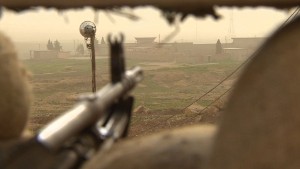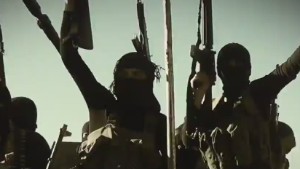Sources: U.S. copters support Iraqi troops battling ISIS
U.S. helicopter gunships supported Iraqi ground forces battling ISIS militants in al-Baghdadi, military sources said, an action that brings U.S. troops closer to combat.
ISIS took control of the town earlier Friday.The U.S. military also deployed Apache attack helicopters against an ISIS assault on the strategic Ayn al-Assad Air Base about 15 kilometers (9 miles) south of al-Baghdadi, sources said.
Iraqi ground forces killed those attackers and the Apaches safely returned to base without firing a shot, the source said.Robert Baer, a former CIA officer, said the battles may indicate a deepening involvement of U.S. troops in the fight against ISIS.
"I think what we're seeing here is mission creep," he said Friday night. "The Iraqi army is not up to the task. And without the United States Air Force and the military on the ground, a lot of these ... bases would be overrun."Mark Hertling, a retired U.S. Army lieutenant general, said he thought the Iraqi army was improving.
"I think the Iraqi government is getting it back together and, yes, they do need help from coalition forces, U.S. forces right now," he said. "But they're coming around and they realize what a scourge this organization [ISIS] is."Pentagon spokesman Rear Adm. John Kirby described the battle at the air base, saying, "It looks like they at least got to the outer base limits. We're still looking at this and it's hard to say whether they breached the perimeter or not. But they certainly got to the perimeter level at the very least."
He said 20-25 people led by suicide bombers made the attack. Most, if not all, of the attackers were wearing Iraqi military uniforms, Kirby said.The base is huge -- roughly the size of Boulder, Colorado, Kirby said. That city is nearly 25 square miles. And U.S. forces were "several kilometers" away from where the fighting happened, the Pentagon said in a statement.
Ayn al-Assad, the largest military base in western Anbar province still under government control, is where U.S. instructors train Iraqi pilots. Nearly 800 members of Iraqi security forces are training with coalition forces at the air base, the U.S. Central Command said.
And while military officials say the U.S. forces were not directly threatened in the skirmish, Kirby acknowledged that "no question that they're close to danger."

The U.S. team there -- some 400 strong -- doesn't feel immediately threatened, but do have the "right, responsibility, obligation to shoot back" should militants threaten them, Kirby said.U.S. officials have repeatedly downplayed the possibility of renewed ground combat in Iraq after the expensive and divisive U.S. combat operation that drew to a close with the final withdrawal of troops in 2011.
But U.S. and coalition airstrikes do continue in the area.From Thursday into Friday, aircraft from the international coalition against ISIS carried out eight airstrikes in Syria and seven in Iraq, CENTCOM said.Five of the Iraq airstrikes targeted ISIS units and equipment near Ayn al-Assad. The other two attacked targets near Mosul and Sinjar.
The Syrian Observatory for Human Rights said the airstrikes killed at least 20 ISIS militants. One civilian died.

The Ayn al-Assad attack comes amid news that ISIS militants took full control of the western Iraqi town of al-Baghdadi.The ISIS fighters seized the city northwest of the capital of Baghdad after attacking from three directions against Iraqi government forces, the security officials told CNN.The squad that attacked the air base came in from the direction of al-Baghdadi, two security officals in the Anbar provincial office told CNN.
CNN's Phil Black, said that Kurdish Peshmerga fighters were starting to move from the north toward the city of Sinjar, held by ISIS since the summer.The militants' seizure of the city provoked a major humanitarian crisis as its ethnic minority Yazidi population fled onto the rocky slopes of Mount Sinjar, where many became trapped without food and water.
The Kurdish fighters are on the offensive but face a long, difficult battle to win back the city from ISIS, whose fighters are firmly in control there.On Thursday, ISIS attacked Peshmerga fighters in Sinjar, as well as Kurdish forces positioned north of Iraq's second-largest city, Mosul, and the town of Ba'shiqa, east of Mosul.

As fighting on the ground continued, ISIS pressed forward with its propaganda campaign.The organization released photos purporting to show ISIS attacks on security checkpoints near Ramadi and posted video purporting to show them parading captured Peshmerga fighters through the streets in cages. ISIS claims the video was shot in the Kirkuk province of Iraq.ISIS offered up video showing them fixing roads in the al Nibai area, about 70 kilometers (43 miles) north of Baghdad.
News Curtesy: www.cnn.com











